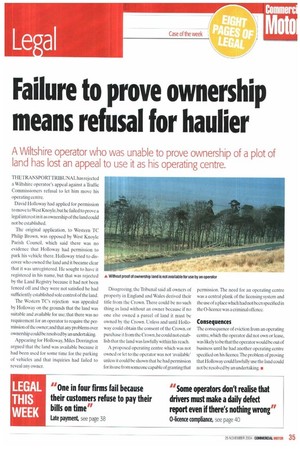Failure to prove ownership means refusal for haulier
Page 35

If you've noticed an error in this article please click here to report it so we can fix it.
A Wiltshire operator who was unable to prove ownership of a plot of land has lost an appeal to use it as his operating centre.
THETRANSPORT TRIBUNAL has rejected a Wiltshire operator's appeal against a Traffic Commissioners refusal to let him move his operating centre.
David Holloway had applied for permission to move to West Knoyle, but he failed to prove a legal interest in it as ownership of the land could not be established.
The original application. to Western TC Philip Brown, was opposed by West Knoyle Parish Council. which said there was no evidence that Holloway had permission to park his vehicle there. Holloway tried to discover who owned the land and it became clear that it was unregistered. He sought to have it registered in his name, but that was rejected by the Land Registry because it had not been fenced off and they were not satisfied he had sufficiently established sole control of the land.
The Western TC's rejection was appealed by Holloway on the grounds that the land was suitable and available for use; that there was no requirement for an operator to require the permission of the owner; and that any problems over ownership could be resolved by an undertaking.
Appearing for Holloway, Miles Dorrington argued that the land was available because it had been used for some time for the parking of vehicles and that inquiries had failed to reveal any owner. Disagreeing. the Tribunal said all owners of property in England and Wales derived their title from the Crown. There could be no such thing as land without an owner because if no one else owned a parcel of land it must be owned by the Crown. Unless and until Holloway could obtain the consent of the Crown, or purchase it from the Crown,he could not establish that the land was lawfully within his reach.
A proposed operating centre which was not owned or let to the operator was not 'available' unless it could be shown that he had permission for its use from someone capable of granting that permission. The need for an operating centre was a central plank of the licensing system and the use of a place which had not been specified in the 0-licence was a criminal offence.
Consequences
The consequence of eviction from an operating centre, which the operator did not own or lease, was likely to be that the operator would be out of business until he had another operating centre specified on his licence. The problem of proving that Holloway could lawfully use the land could not be resolved by an undertaking. •
























































































































































































